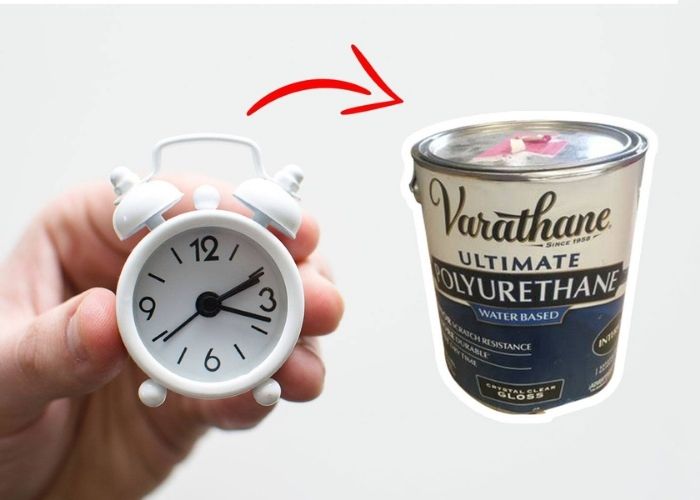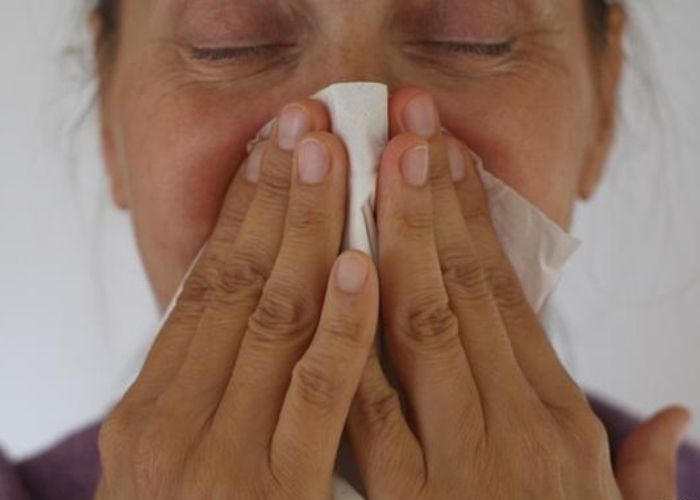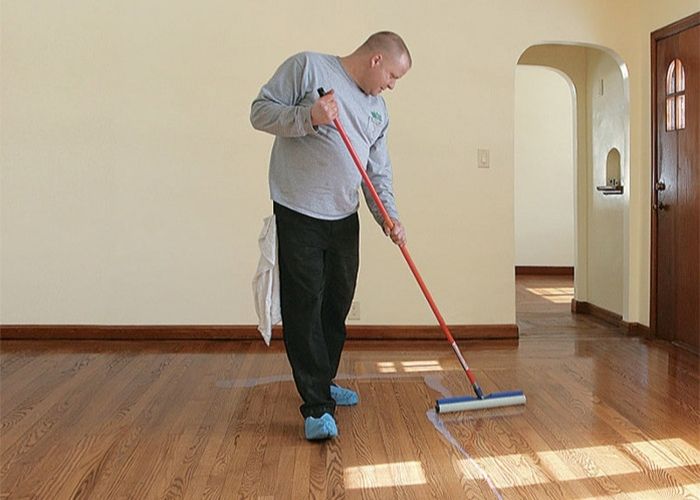Can You Sleep in a House After Polyurethane? Well, polyurethane makes a fine finishing product. But with that comes the health and environmental hazards because of its toxicity.
Most clients prefer to oversee projects in their homes, and that’s okay. However, some projects may require households to evacuate while others don’t.
If you have a Polyurethane project underway or upcoming, read this article to the end for our recommendation on what to do and expect.
Let’s get into it
Can You Sleep in House After Polyurethane?
No, it is not recommended, and you shouldn’t take chances. Polyurethane will be off-gassing heavily for the first 24 hours, even for the water-based type. It is worse if you use oil-based finishes: it’s highly toxic and can cause several health problems. So stay away for at least two days.
Does polyurethane off gas?
Yes, polyurethane can off-gas. Polyurethane products, particularly when freshly applied or curing, release volatile organic compounds (VOCs) into the air.
These VOCs can contribute to the characteristic smell and potential indoor air quality concerns. Proper ventilation is important during and after the application of polyurethane to minimize the impact of off-gassing.
Can You Sleep in the House After Using Water-based Polyurethane?
It is possible to sleep in other rooms that were not finished with polyurethane. This is because water-based polyurethane is generally considered low odor and less toxic than oil-based.
It also dries fast -2 to 3 hours so you can apply multiple coats within the day. For the first 24 hours, maintain socks-only traffic.
See more: How to polyurethane wood table.
Can You Sleep in the House After Using Oil-based Polyurethane?
No. By all means, avoid sleeping in the house after refinishing surfaces using oil-based products. Oil-based polyurethane emits a strong smell that’s uncomfortable to be around.
Exposing yourself and others to such a highly toxic environment is neither safe nor smart.
Interesting read: What is the difference between satin and semi-gloss polyurethane finish?
How Long Do You stay out of the House After Polyurethane?
At the very least, you should stay out of the house for the first two days after the last coat of polyurethane. Then, if you can, you should stay away for 5 to 7 days, even if the other rooms in the house have not been refinished.
Polyurethane fumes are highly toxic and extremely harmful to human and animal health: you shouldn’t take chances with them. In addition, the less movement there is in the house, the better.
How Long Does Polyurethane Take to Dry and Cure?

Applying polyurethane is a walk in the park. But the quality of the results relies on the conditions surrounding polyurethane dry and cure time.
Drying time refers to how long a product will take to dry and be ready for the next coat: it’s often some hours.
While curing time implies the total time a finished surface needs to dry fully, harden, and be usable without chipping off, it often takes weeks.
You can check “How long does it take polyurethane to dry” article to learn more about speeding up poly drying time.
Oil-based polyurethane
Oil-based polyurethane has a thicker consistency and needs about 24 hours to dry and accept the second coat. However, the fast-drying formulations only need as little as 4 hours to dry for subsequent coats.
The time oil polyurethane requires to cure fully is upward of 30 days. But, again, the number of coats applied and weather conditions affect the time required.
Water-based polyurethane
Under optimal conditions –warm temperatures and low humidity – floors finished with water-based polyurethane can dry enough for another coat in two hours. Water-based poly can also cure in at least three days or up to 3 weeks.
The time frame relies on the weather conditions and the number of coats of polyurethane applied. Water-based polyurethane dries faster because once the water evaporates from the surface, that’s it.
Read also: Can you tint oil-based polyurethane?
Are Polyurethane Fumes Harmful?
Yes, Polyurethane fumes are toxic and harmful to human beings and animals. This product is technically a petrochemical resin made of isocyanates–respiratory toxins.
These toxins are especially detrimental for people suffering from respiratory diseases.
What Makes Polyurethane Toxic?
Read Also: Is Water Based Wood Stain Toxic?

You may be wondering what makes polyurethane a toxic product yet efficient as a finish for woodworking projects. Here’s the brief:
Volatile organic compounds are chemicals that make up the primary components of polyurethane products. These VOCs are released into the air in the form of gas, and they are responsible for the toxicity of this product.
Isocyanates are another component of polyurethane that makes it a toxic product. Isocyanate is a compound with the same toxic effects as VOCs, only that it’s been found to cause cancer in animals, not humans.
Volatile Organic Compounds and Isocyanates are mostly toxic during production, application, and while it dries and cures. Once it is fully cured, it’s no longer harmful.
That’s why wearing personal protective gear when handling this and other finishing products is always mandatory.
What Happens if You Breathe in Polyurethane?
Is polyurethane toxic to breathe? Let’s find out.
There are health dangers associated with exposure to polyurethane fumes. Inhaling these fumes can trigger eyes, nasal, throat, and skin irritation.
Prolonged exposure may result in nausea, vomiting, headaches, dizziness, or even difficulty in breathing.
Inhaling these fumes over long periods, say few years, is also linked to causing asthma, damage to the brain, bone marrow, kidney, and liver damage.
Are you aware that polyurethane fumes harm animals? As a matter of fact, they can cause cancer in animals. Keep your pets safe.
Can polyurethane fumes kill you?
While exposure to polyurethane fumes can cause discomfort and health issues, it is unlikely to result in immediate death in typical circumstances.
However, inhaling high levels of polyurethane fumes can lead to respiratory irritation, dizziness, headaches, and nausea.
Prolonged exposure to excessive levels of fumes may pose more significant health risks. Ensure proper ventilation and follow safety guidelines when working with polyurethane to minimize potential health hazards.
Other Post: Wood Stain Safety for Vegetable Garden
How Long Do Polyurethane Fumes Last?
Fumes from water-based polyurethane can last up to 21 days, while oil polyurethane fumes last for 30 days or more.
However, there are polyurethane products with extra fast-drying capacities; their fumes dissipate fully within a week after application.
How Long Does Water-Based Polyurethane Off-Gas?
Water-based polyurethane off-gasses for 24 hours after the last coat. The process called off-gassing refers to polyurethane mixing with oxygen during the drying and curing process.
Polyurethane emits potentially harmful chemicals into the air during the curing process -poly smell. However, after 24 hours, the smell becomes less noticeable because this product dries and cures fast.
How Do You Get Rid of the Polyurethane Smell Fast?
There are several tried-and-tested methods of polyurethane odor removal. These methods help restore clean, fresh air in the family room or other affected rooms.
The advantage is that you can use multiple methods to speed up the process.
Ventilate
We always recommend working in a well-ventilated space. Therefore, begin here.
Open windows
This is one of the obvious methods. Open all the windows, doors, and any other fresh air inlet to promote air exchange and expulsion of toxic smell.
Keep the windows and other air inlets open for as long as necessary. Also, ensure that rags and polyurethane cans are disposed of in appropriate places.
Use Fans
Another practical method is to run fans to promote free airflow and eventually drive out the stinky odors. You can use box fans placed at the open window, table fans, or even overhead fans.
Again, the goal is to get air moving and banish the lingering smell from the house.
Filter out toxins using an air purifier
Run an air purifier in the room where polyurethane is off-gassing. The purifier breaks down the volatile organic compounds in the air and neutralizes them using ozone or an activated charcoal filter. Keep it running until the stench dissipates fully.
For large workshops, you may want to fit an air filter system for wood shop.
Turn up the heat
You can warm up the room by turning on the thermostat. Warm temperatures with low humidity speed up polyurethane products’ drying and curing process.
While at it, keep the windows and doors closed to maintain the temperature indoors. Once the polyurethane finish cures completely, ventilate the house with every means available.
Absorb the stinky odors
Absorbing the smell is also a viable method. Use this option alongside the other methods to get the desired results in record time. There are various items you can use under this method.
Use onion and lemon slices in bowls of water
Space several bowls on the floor and let them sit overnight. Onions are known to draw in toxins and eliminate bad odor. Replace them regularly.
Use baking soda and activated charcoal
These are products in powder and are quite efficient at getting rid of polyurethane smell fast. Put a bit of either or both of these products on paper plates and space them on the refinished floors. Replace them regularly.
Try vaposorb granules or kitty litter
These products are worth a try. Sprinkle them on the floor 24 hours after the last coat of polyurethane. Ensure that it sits on the surface without sticking to the finish. These products will absorb the fumes and reduce toxicity. Sweep up and re-sprinkle as necessary.
Related Post: How to Get Rid of Stain Smell on Wood
When Can I Put Furniture on Polyurethane Floor?
If you must return furniture soon, wait 2 to 4 days. Applying water-based poly on your floors should be good enough for two days. However, you’ll need to wait at least 4 days using oil-based poly.
Remember, the longer you wait for the surface to dry, the better. In any case, lift and place the furniture on the floor.
Please resist the urge to drag it across the room, or you risk scuffing the finished floor. But if you accidentally create a conspicuous scar, read here for tips on applying fresh polyurethane over existing poly.
Can I Stay in my House While the Floors Being Refinished?
It is generally considered inconvenient to stay in the house while refinishing floors.
That’s because refinishing hardwood floors often involve some degree of dust, noise, and vapors from the products used. These fumes can linger in the air and trigger irritation to the respiratory organs, nausea, and headaches.
Aside from the toxic smell, movement on the wood floor across rooms will get in the way of the work process and consequently jeopardize the results of the refinishing project.
Read our article for recommendations on choosing a polyurethane finish for hardwood floors.
FAQs
How long do polyurethane fumes last?
The duration for which Polyurethane fumes can last depends on the type of poly used. Fumes from Water-based poly often dissipate completely after 21 days. An oil-based poly smell can take 30 – 45 days to clear. Fast-drying polyurethane fumes only last 3-7 days.
How long for polyurethane smell to go away?
- Water-based polyurethane: The smell of water-based polyurethane typically fades relatively quickly. You can expect the odor to diminish significantly within a few days to a week. After about two weeks, the smell should dissipate completely.
- Oil-based polyurethane: The smell of oil-based polyurethane tends to linger longer than water-based variants. It can take around two to three weeks for the strong odor to fade substantially. Complete dissipation of the smell may take up to a month or longer.
Is polyurethane toxic after it dries?
No, polyurethane isn’t toxic after it dries. Polyurethane is most toxic during application and while it dries. Once it’s fully dry, it’s free of toxins, and you can barely detect its smell in the air: unless you go sniffing the finished surfaces.
Is it safe to use polyurethane indoors?
Yes, it is safe to use polyurethane indoors, provided you adhere to the safety precautions. Always use interior poly for indoor surfaces. You can also use exterior poly for interior surfaces, but you’ll need extra precaution and ventilation because they tend to have a strong toxic smell. (Also find out whether polyurethane is safe for food in our guide.)
Can you sleep in house after staining floors?
Sleeping or staying in a house after staining floors is a terrible idea. The stain fumes are often overwhelming and highly toxic. In addition, exposure to such a stinky smell for long periods can trigger severe breathing problems and other health issues for humans and pets.
How long should you stay out of house after refinishing floors?
Stay out of the house for at least 2 days after refinishing floors. This allows sufficient time for the polyurethane or other finishing products to dry and off-gas. However, consulting with the professionals who performed the refinishing is advisable, as drying times and specific product recommendations may vary. Their guidance will provide the most accurate information for your situation.
How long after polyurethane can you walk on floors?
We recommend waiting at least 24 hours before walking on polyurethane wood floors. Even so, you ought to avoid shoes or walking bare feet. Instead, consider wearing socks and, if necessary, get doggie socks for dogs. This will ensure the finished floor remains intact.
Read also: Best way to apply polyurethane to floors.
How long for hardwood floors to cure
The standard cure time for hardwood floors is 30 days. However, this time frame can vary slightly depending on the product applied to the hardwood floors and weather conditions. Avoid putting area rugs on the surface before full cure.
Final thoughts on how long is polyurethane toxic
Can you sleep in the house after polyurethane? Please don’t. We highly recommend staying away from the house for a few days, even if the floors refinished are in the other rooms.
Polyurethane is a great finish for wooden surfaces, but its fumes are highly toxic and can cause detrimental effects on your health and that of pets.
If you found this blog post insightful, feel free to share it.
What next? Check out our article on how to thin polyurethane for spraying for more insight. Good luck with your polyurethane projects!


I am finishing 4 bookcases, desk & 3ft door. If I ventilate, will it be safe to sleep in the room opening to the room with shelves?